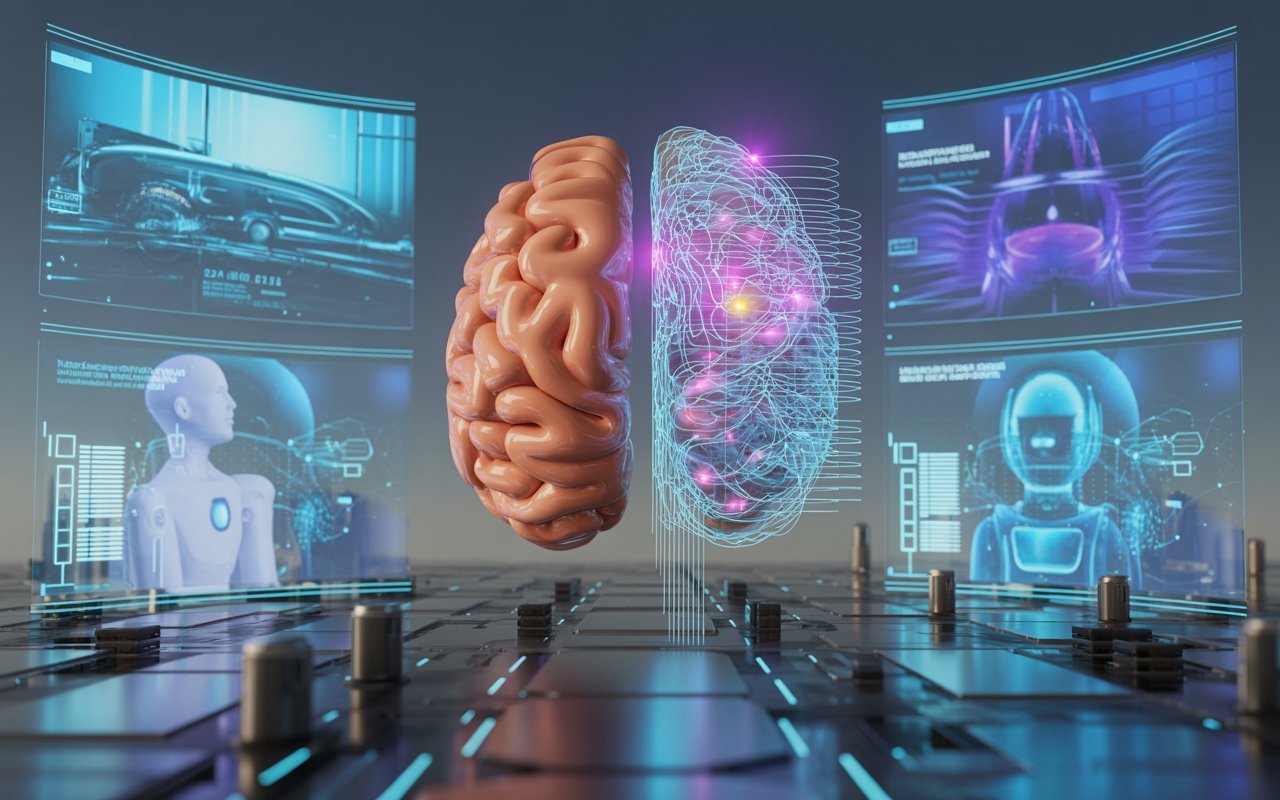Introduction: The Rise of Intelligence Beyond Humans
AI has become a regular part of our daily lives, often without us even realizing it. From unlocking your phone with your face to getting tailored recommendations while shopping, artificial intelligence is helping make these things happen. We’re in the middle of a big change in technology where machines are not just helping us—they’re also learning, adjusting, and growing. to understanding what AI is. It’s more important than everWhether you work in technology or not, AI is likely to affect your job, your learning, and your future.
What is Artificial Intelligence?
reasoning and problem-solving.Artificial intelligence is about machines being able to copy human thinking skills, like learning. . simpler terms, it’s about creating intelligent systems that can perform tasks requiring human intelligence.
AI is often confused with related terms:
- Machine Learned (ML) is a subset of AI where machines learn from data.
- Deep Learning is a further subfield of ML, involving neural networks that mimic the human brain.
While AI is the big picture, ML and deep learning are the engines driving its evolution.
A Brief History of AI
AI has its origins in old stories and myths about smart machines, but the modern study of AI started in the 1950s. A British mathematician named Alan Turing came up with the idea that machines could think, which led to the creation of the Turing Test.
Important milestones include:
In 1956, the term “Artificial Intelligence” was first introduced. In 1997, IBM’s Blue defeated the chess world champion, Garry Kasparov. In 2016, the AI program AlphaGo beat the top Go player in the world.
AI has gone through periods of rapid growth followed by slowdowns, called AI winters, but new advancements have made AI more important than ever.

.How Does AI Work?
AI systems work by analyzing data through complex algorithms. create predictions, and improve through experience. These systems identify patterns
Key components:
- Data: The raw information AI learns from
- Algorithms: The logic that processes the data
- Training Models: Where the AI learns and adjusts
Types of learning:
- Supervised Learning: AI learns from labeled data
- Unsupervised Learning: AI identifies patterns on its own
- To illustrate, by trial and error, Reinforcement Learned: AI learns
Neural networks are used to replicate how the human brainly processes knowledge, especially in deep learning applications such as voice recognition and language translation.
Types of Artificial Intelligence
AI is generally categorized into three types:
- Narrow AI (Weak AI)
- Performs a specific task (e.g., spam filters, Siri, chatbots)
- Performs a specific task (e.g., spam filters, Siri, chatbots)
- General AI (Strong AI)
- think and reason,a human, A theoretically form of AI that can
- Artificial Superintelligence (ASI)
- Hypothetical AI that surpasses human intelligence
Most AI systems today fall into the Narrow AI category.
- Hypothetical AI that surpasses human intelligence

Where Is AI Used Today?
AI is already being applied in multiple industries:
- Healthcare: Diagnosing diseases, robotic surgery
- Finance: Fraud detection, automated trading
- Retail: Personalized shopping, inventory management
- Entertainment: Streaming recommendations, content creation
- Education: Smart tutoring systems, personalized learning
The team uses AI when the team: in daily life
- Ask a virtual assistant for help
- Get Netflix or YouTube recommendations.
- Use Google Maps or translation apps.
Benefits of AI: Why It Matters
AI brings immense advantages:
- Efficiency: Automating routine tasks
- Innovation: Creating new products and services
- Productivity: Reducing human effort and error
- Decision-making: Enhancing accuracy through data insights
- Customer Experience: Delivering personalized interactions
AI is not just about machines—it’s about enabling humans to do more with less.
Challenges and Ethical Concerns
With great power comes great responsibility. Key concerns include:
- Job Displacement: Automation replacing human roles
- Biased data can reinforce discrimination
- Biaes: AI systems trained on
- Privacy: Collecting a lot of data makes people worry about being watched.
- Accountability: Who is liable when AI makes a wrong decision?
Developers and governments must focus on ethical AI that is transparent, fair, and accountable.
The Future of AI
The next wave of AI includes:
- Generative AI: Creating art, music, and code
- Cognitive Systems: Understanding and interacting like humans
- Robotics: AI-powered machines performing physical tasks
AI will likely reshape the job market, influence government policies, and change how we live and interact.
Preparing for this shift requires:
- Lifelong learning
- Updated policies and laws
- Inclusive and ethical development
Conclusion: Artificial Intelligence Benefits
Artificial Intelligence is not just another tech trend; it’s the beginning of a new era. The more we understand and guide its development, the better we can use it to improve lives, solve problems, and build a smarter world.
Whether you’re a student, a professional, or just curious, now is the time to learn about AI and adapt to its growing role in society.
Blog Summary:
Artificial Intelligence, or AI, isn’t just something from the future anymore—it’s a powerful tool that’s changing how industries work, making everyday life better, and making us rethink what intelligence means. It helps run virtual assistants, helps doctors find diseases, and is pushing innovation everywhere. This blog gives a clear explanation of what AI is, how it functions, why it matters, and how it’s affecting the future. Whether you’re just starting out or in charge of a business, this guide will help you understand the big role AI plays in today’s world.
FAQs
Q1: Is AI the same as machine learning?
A: Machine learning is part of AI that helps machines learn from data. AI is a bigger area that includes many different ways machines can be smart.
Q2: Can AI completely replace human jobs?
A: AI can take over some jobs, but it also makes new jobs possible. What happens next will depend on how we prepare and learn new skills.
Q3: Is AI dangerous?
A: AI can be used in harmful ways or cause unexpected problems if not handled carefully. That’s why it’s important to use AI ethically and responsibly.
Q4: Do I need technical skills to understand AI?
A: Just having a simple idea of how AI works and what effects it can have is enough for most people to keep up and stay involved.
Q5: How can I learn more about AI?
A: Begin with easy-to-follow courses, read from trusted tech websites, or try using AI tools and platforms on your own.






[…] today’s quickly changing world of artificial intelligence, one area is quietly making some of the biggest advancements in prompt engineering, not about […]
Absolutely!Prompt engineering is quietly reshaping how we get the best out of AI. Great point!